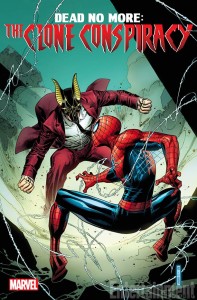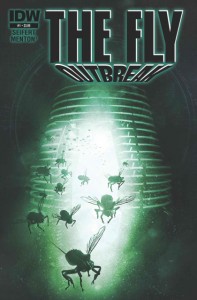 This week, Marvel and Spider-Man writer Dan Slott announced that this fall’s Spider-Man event will be called The Clone Conspiracy, and will feature The Jackal and the clone of Gwen Stacy, possibly bringing a bunch of long dead Spider-Man characters back from the grave. We initially had a very negative reaction to this news, because any Spider-Man title that includes the word “clone” brings back memories of the 1990s Clone Saga… but then we realized that neither of us had actually read all that much of the original Gerry Conway clone stories from the 1970s, or the Clone Saga stories from the mid 90s.
This week, Marvel and Spider-Man writer Dan Slott announced that this fall’s Spider-Man event will be called The Clone Conspiracy, and will feature The Jackal and the clone of Gwen Stacy, possibly bringing a bunch of long dead Spider-Man characters back from the grave. We initially had a very negative reaction to this news, because any Spider-Man title that includes the word “clone” brings back memories of the 1990s Clone Saga… but then we realized that neither of us had actually read all that much of the original Gerry Conway clone stories from the 1970s, or the Clone Saga stories from the mid 90s.
So we ran out and purchased the trade of the original clone stories from 1975 through 1990, and one of the trades of the 90s Clone Saga, to see how we really felt about the clone stories in the face of the actual works. And we discussed, in the face of actual exposure to the clone stories, whether we wanted to see any more clone stories… and whether we did or not, if they could possibly overcome the reputation of the 90s Clone Saga.
We also discuss:
- Civil War II #2, written by Brian Michael Bendis with art by David Marquez,
- Superman #1, written by Peter Tomasi with art by Patrick Gleason, and:
- Batman #1, written by Tom King with art by David FInch!
And, the usual disclaimers:
- This show contains spoilers. If you don’t want to learn the ending of who wound up with the mantle of Spider-Man at the end of The Clone Saga 21 years ago, you are a wise person with good taste in serialized graphic storytelling! But we’ll still ruin it for you.
- This show contains adult, profane language, and is therefore not safe for work. If you don’t think your mom wants to hear how there’s a big bit of Hal Jordan in Carol Danvers, then get some headphones.
Podcast: Play in new window | Download (Duration: 1:50:18 — 108.3MB)
Subscribe: Apple Podcasts | Android | Google Play | Stitcher | TuneIn | RSS | More
Thanks for listening, suckers!


 Podcast RSS Feed
Podcast RSS Feed iTunes
iTunes Google Play
Google Play Stitcher
Stitcher TuneIn Radio
TuneIn Radio Android
Android Miro Media Player
Miro Media Player Comics Podcast Network
Comics Podcast Network